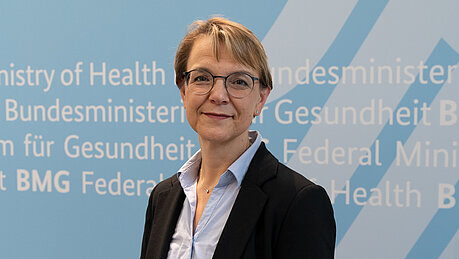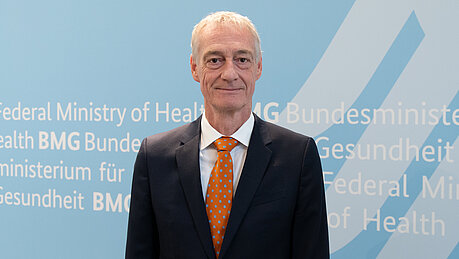genomeDE – National Strategy for Genomic Medicine
Genomic medicine holds the potential to decisively improve the prevention, diagnosis and treatment of certain diseases. The genomDE strategy aims to give all patients access to these benefits over the long term. Along the way, ethical, regulatory and safety questions must first be clarified. Having laid the legal foundations in 2021, the next step is to build an appropriate data infrastructure.
The fundamental goals and challenges of the genomDE National Strategy for Genomic Medicine were identified early in 2019. Research has made rapid advances since the first complete sequencing of the human genome in 2003 and has demonstrated that certain patients can greatly benefit from an analysis of their genome sequences. Thanks to genomic medicine, doctors are becoming increasingly skilled at diagnosing and treating diseases as well as instituting individualised preventive measures. Tailored to a person’s individual genetic make-up, this personalised medicine offers major advantages that should be made available to all citizens as soon as possible. At the same time, however, genomic data are sensitive personal data that also allow inferences to be made about close blood relatives. Therefore, data security and the informed consent of those concerned are indispensable and, as such, an integral part of the genome initiative.
Overview of the genomeDE strategy
© Copyright: BMG
Grafik Zeitstrahl genomDE - englisch
When drafting the strategy, the Federal Ministry of Health (BMG) started by facilitating initial research to clarify the prerequisites, goals and possible implementation in Germany. In December 2019 the report “Recherche zu Gestaltung und Betrieb einer bundesweiten Plattform zur medizinischen Genomsequenzierung zur weiteren Verbesserung der Gesundheitsversorgung der Bürgerinnen und Bürger (genomDE)” (“Research into the design and operation of a nation-wide platform for medical genome sequencing to further improve citizens’ healthcare” – in German only was published and presented the first results and recommendations for action.
Then, in January 2020, Germany became the twenty-first EU Member State to join the EU’s “1+ Million Genomes” Initiative, which aims to sequence more than one million genomes thereby improving health care. Especially where rare diseases are concerned, regionally or nationally available patient pools are too small to enable meaningful scientific studies. However, this also applies to other diseases. The more data are available, the better and more robust the results. This is why the European initiative seeks to pool data systematically from across Europe – while strictly observing privacy and data security.
To further push ahead with the development of the National Strategy, the project “Structural Support for a National Genome Initiative of the Federal Ministry of Health (genomDE)” funded by the European Commission under the structural reform programme (GD REFORM) was launched in July 2020. The programme was designed to support the preparation and implementation of growth-enhancing administrative and structural reforms by mobilising EU funds and technical expertise. In November 2020, the results achieved until then, and the genomDE strategy, were revealed to the public for the first time at the digital event “National and European Genome Initiatives”.
On the path to incorporation into routine patient care, the results of these extensive preparatory efforts focus on three key subject areas. In addition to informing and involving patients, as well as setting up appropriate data infrastructure, one priority task must be to clarify the legal prerequisites. When the Act to further develop health care provision (Gesetz zur Weiterentwicklung der Gesundheitsversorgung) entered into force in July 2021, it provided as a first step the legal basis in the form of §64e of Social Code Book V “This Model Project for the comprehensive diagnosis and therapy identification by means of genome sequencing in cases of rare and oncological diseases, power to issue ordinances ” (“Modellvorhaben zur umfassenden Diagnostik und Therapiefindung mittels Genomsequenzierung bei seltenen und bei onkologischen Erkrankungen, Verordnungsermächtigung”). Set to run for at least five years, the Model Project enables the integration of genomic medicine into healthcare in Germany. The Model Project is scheduled to start as early as January 2024.
Another important pillar is designing the corresponding data infrastructure. Since October 2021, this complex task is being undertaken by the Initiative for the establishment of a nation-wide platform for medical genome sequencing – genomDE – which is funded by the Federal Ministry of Health (BMG). Here, an interdisciplinary 14-member consortium designs and sets up a nation-wide platform that, by cooperating with the Model Project, is to enable wider clinical application of genome sequencing and, as a result, facilitate improved diagnosis and personalised treatment identification. The initiative also aims to set up care structures, network genomic medicine structures, establish standards in sequencing technologies and the clinical use of these data, and address the training and further training of medical personnel. Furthermore, the consortium, which also includes patient representatives, seeks to involve citizens and patients right from the outset to enhance acceptance and provide early answers to questions regarding not only its benefits, but also its risks.




























